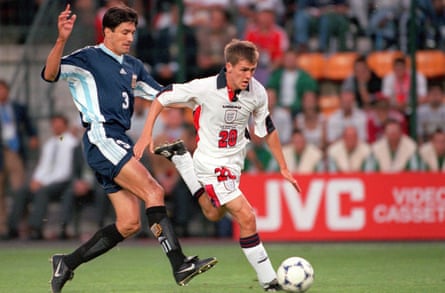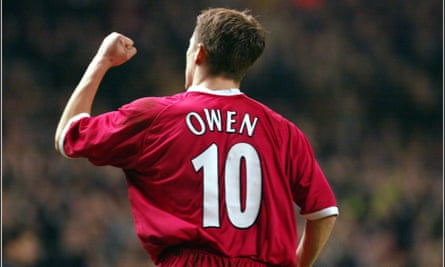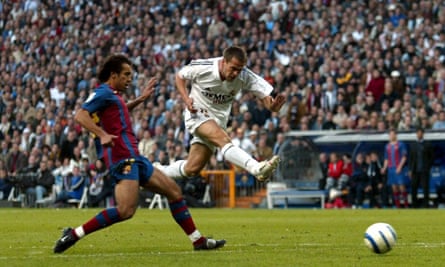1) That goal against Argentina (1998)
Michael Owen might have become a mild figure of fun in retirement, mocked for his stubborn hatred of films, castigated for that YouTube clip of him goading a 13-year-old goalkeeper and widely criticised for his punditry, but the bantz can make it easy to forget what a brilliant footballer he was at his peak – one of the most gifted ever produced by England.
“When he was the same age as Marcus Rashford, he’d won two golden boots in the Premier League and scored 50 goals,” Rio Ferdinand said recently. “Even look at the likes of [Kylian] Mbappé. If he’s going for that type of money now what would [Owen] be going for?”
Fair point. From the moment the teenage Owen burst on the scene with a smoothly taken debut goal at Selhurst Park in May 1997, utilising the searing pace that made him such a threat, it was clear he was special. Owen did not take long to establish himself in the England squad, although he was upstaged by Chile’s Marcelo Salas on his debut in February 1998.
Glenn Hoddle told the press that Owen was not a natural goalscorer and initially named the 18-year-old on the bench at the 1998 World Cup, preferring the Euro 96 vintage of Alan Shearer and Teddy Sheringham. Yet Sheringham was out of form after a difficult first season at Manchester United and England lacked craft and unpredictability, especially with Hoddle getting his Davids mixed up and starting Batty instead of Beckham in midfield.
History might have been different had Owen started. He came on in the second game against Romania and equalised with nine minutes left, but Graeme Le Saux’s error let in Dan Petrescu for a last-gasp winner that left England second in Group G, pitching them against the mighty Argentina in the last 16.
So much would happen on that night in St Étienne. England’s 10 men lost on penalties in the end, but only after a virtuoso performance from Owen, whose claim to stardom was cemented in this match. He terrorised Argentina from the start, an early run almost creating a goal, and helped England draw level when he made the most of minimal contact with Roberto Ayala to win a penalty after 10 minutes.
Six minutes later, it happened. An accurate pass from deep from Beckham, a clever piece of control from Owen, and then, as David Lacey wrote in the Guardian, a blur of white.

Viewed in the cold light of day, the goal arguably seems overrated. To hear it described, it can sound as though Owen ran the length of the pitch and beat every Argentina defender. In reality, it was not in the same league as Diego Maradona’s extraordinary goal in 1986. Owen picked up possession inside Argentina’s half and only had to beat Ayala after shaking off José Antonio Chamot. Where had the Argentinian midfielders got to? No matter: Owen ran straight, swerved at pace into the area, and found the top corner.
But the context matters. It was Owen’s swagger, fearlessness and certainty, the authority to push Paul Scholes aside. The quality of the opposition and the enormity of the occasion, and the fact he was only 18 – the sheer chutzpah of doing that at 18 – all contributed to one of the most exhilarating World Cup goals of all time. At that point, everything felt possible because of Michael Owen.
2) The ‘Owen final’ against Arsenal (2001)
Arsenal fans remember it as the Henchoz final, and it is difficult to think of a more infuriating defeat from Arsène Wenger’s early years. Blowing this one was even more maddening than the FA Cup semi-final defeat to Manchester United in 1999. Yes, Arsenal may well have blown a chance to repeat the Double but at least they played their part in that epic. There was honour in defeat to the eventual Treble winners; losing to Liverpool after threatening to spank them out of sight was just careless.
Despite Patrick Vieira stomping all over Steven Gerrard and the rest of the Liverpool midfield in Cardiff, Arsenal contrived to not break the deadlock until Freddie Ljungberg’s goal after 72 minutes. That was partly down to Stéphane Henchoz somehow escaping punishment in the first half, when he blatantly handled Thierry Henry’s goalbound shot on the line. The defender got away with a less obvious handball later on, too, and Liverpool found a way to hang on.
After years of flattering to deceive, Gérard Houllier’s side were developing a hardened edge that caused him to observe that they were “destined for greatness”. However, Arsenal seemed to have the measure of them – until Owen got involved. Arsenal had mostly dealt with the striker’s threat, but hadn’t killed Liverpool off. When Gary McAllister’s free-kick dropped to Owen with seven minutes left, the ball was drilled past David Seaman in a flash. It was a classic piece of poaching from a striker who had barely had a sniff all afternoon.Owen won the game five minutes later, racing on to a Patrik Berger long ball on the break and making the Arsenal defenders suddenly look their age. Running in from the left, on his weaker left foot and facing a tight angle, he aimed a low shot across Seaman to complete a stunning turnaround. He had also made an FA Cup final all about himself in the space of five minutes. It takes a special talent to do that.

3) Winning the Ballon d’Or at Liverpool (2001)
One of the curiosities of Owen’s career was that he struggled to flourish in partnerships that made perfect sense on paper. Injuries, form and circumstances often got in the way. It never quite clicked with Shearer or Wayne Rooney for England, while it gnawed away at Liverpool that they rarely saw Owen and Robbie Fowler at their best together.
Fowler was hit by a serious injury just as the teenage Owen was starting to make his mark, while Houllier came to lose his faith in them as a pair. He preferred Emile Heskey for his unselfish work-rate, even though he lacked Owen’s directness and Fowler’s impudence. Houllier went with Heskey for all three of Liverpool’s finals in the 2000-01 season, leaving the other two to fight for a spot alongside him.
Owen was an unused substitute when Fowler scored a superb volley in the League Cup win over Birmingham. His momentum had stalled when he pulled a hamstring against Leeds in April 1999 and he struggled with muscle problems the following season, mustering 12 goals in all competitions. He responded to adversity by working even harder. The sweat and toil was worth it – 2001 would belong to Owen.
He built on sucker-punching Arsenal by helping Liverpool beat Bayern Munich in the Super Cup, grabbing the decisive goal against United in the Charity Shield and scoring a hat-trick in England’s 5-1 win away to Germany in World Cup qualifying. More than anything, it was that breathtaking display in Munich that earned Owen the Ballon d’Or.
The injuries that marred the end of Owen’s career can make it easy to forget how much opponents feared him. No defender wanted to be left isolated against peak Owen, who was undoubtedly one of the best strikers in the world. While Fowler moved on to Leeds, Owen ended the year by coming off the bench at Upton Park, rescuing a point for Liverpool by crashing in his 100th goal for the club.
4) Scoring for Real Madrid in a clásico (2005)
One of Owen’s biggest problems was that supporters found it difficult to identify with him. Part of Fowler’s appeal was that along with being a brilliantly inventive striker, supporters could recognise themselves when they saw him play. Fowler’s cheek, wit and personality always shone through and it was clear how much Liverpool – the club and the city – meant to him. Owen exuded less warmth and felt duller, less relatable. Next to Fowler, the man known as God on the Kop, Owen seemed like a robot who had mastered the art of goalscoring but was still working on human interaction. He was respected, Fowler was revered.
Owen won six trophies to Fowler’s five at Liverpool. Owen was seen as a world-class talent, whereas Fowler’s greatest moments were largely restricted to a two-year spell tearing up the Premier League. But it mattered to supporters that Fowler got Liverpool. It also mattered that Owen’s ambition and single-minded approach could be mistaken for aloofness. Some players regard it as a job. For supporters, it’s a religion.
Owen remained prolific, scoring the clincher in the 2003 League Cup final, but the team had become dull and laboured by the time Houllier left, and many felt Owen cared more about his international career. After six months of tortuous negotiations with the board, Owen had a year left on his contract, which left the new manager, Rafa Benítez, in an unenviable position when Real Madrid offered £8m plus Antonio Núñez for the 24-year-old.
Owen did not settle in Madrid. He was behind Raúl and Ronaldo in the pecking order and his young family struggled to acclimatise to Spanish life. His goalscoring record was still impressive despite a lack of playing time, though, and the highlight of his one season in that famous shirt came when he scored – from a Beckham through pass – in a raucous 4-2 home win over Barcelona in April 2005.

One month later, Liverpool won the Champions League without Owen, who would never come close to being a European champion. If he had his time back, would he do things differently?
5) Another goal against Argentina (2005)
If there is a tinge of sadness to the St Étienne goal – other than it coming in an agonising England defeat – it is that Owen never really scored one like it again. Not once the hamstrings started to play up. Between France 98 and Euro 2000, where he struggled in Kevin Keegan’s deathly side, he scored three goals in 10 matches. Owen was substituted in each of England’s group matches, his only goal of the tournament coming in the wretched defeat to Romania.
After toiling under Keegan, Owen thrived again when Sven-Göran Eriksson took over, scoring 28 goals in 56 matches. He continued to love tormenting Argentina, too, and annoyed them by winning a debatable penalty at the 2002 World Cup. “Owen jumped like he was in a swimming pool,” said Mauricio Pochettino in 2016. “I didn’t touch him.”
Come November 2005, England’s Golden Generation were getting ready to win the World Cup, and nothing was going to stop them after a thrilling friendly win over Argentina in Geneva. Rooney scored for England in the first half, before two late headers from Owen turned a 2-1 defeat into a 3-2 victory. Owen might not have been tall, but he had killer instincts and always knew how to find space in the area.
Rooney and Owen could have formed a devastating partnership, but it proved to be another in a long line of lost England opportunities. A month later Owen broke his foot while playing for Newcastle. He recovered in time to make the World Cup – and damaged his cruciate ligament in England’s final group match. It was the beginning of the end.
6) A late, late Manchester derby winner (2009)
After a year in Madrid, Owen wanted to return home in the summer of 2005. Liverpool were reluctant to meet the £16.5m asking price, so instead he joined Newcastle, where … well. Let’s just say that Owen could only have made himself more unpopular with Newcastle fans if he had snuck into St James’ Park and painted the stadium red and white.
At least he still had admirers elsewhere after Newcastle went down in 2009, although few people suspected that one of them would be Sir Alex Ferguson, who jumped at the chance to sign Owen on a free. The transfer came as a shock, especially to United fans who were expecting more than a waning former Liverpool striker to soothe the blow of losing Cristiano Ronaldo and Carlos Tevez. The pace had gone, taking much of Owen’s menace with it, but he still had the knack in the area, and that old sense of drama was undiminished. Old Trafford didn’t look too bothered about Owen’s past affiliations when he won the 153rd Manchester derby in the sixth minute of added time.


Comments (…)
Sign in or create your Guardian account to join the discussion